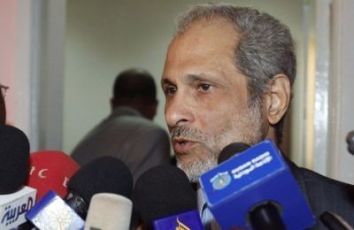RNP to pull out from Sudan’s national dialogue
June 4, 2014 (KHARTOUM) – The Reform Now Party (RNP), which is led by a ruling party dissident, has announced its intention to suspend its participation in the ongoing national dialogue process in response to what it described as a series of setbacks to political freedoms in the country.

The party led by former presidential adviser Ghazi Salah al-Din al-Attabani also cited the arrest of the National Umma Party (NUP) chief al-Sadiq al-Mahdi last month as a reason for its decision. The NUP also made a similar move in wake of its leader’s detention by authorities.
The opposition leader has been in jail since the May 17th as he is accused by the National Intelligence and Security Services (NISS) of defaming the Rapid Support Forces (RSF). Al-Mahdi accused the government militia of committing war crimes and atrocities against civilians in Darfur.
In its statement, the RNP noted the decline in political freedoms and actions taken against newspapers and the announcement by the ruling National Congress Party (NCP) of its intention to introduce amendments to the election law without consulting opposition forces.
This was described by the RNP as a “negative indicator” which reflects ill-intentions towards dialogue and brings to question the level of commitment to its outcome.
Last January, Sudanese president Omer Hassan al-Bashir announced a 4-point plan for reform “to stop the war and bring peace, free political society, fight against poverty and revitalise national identity”, calling for political forces to engage in dialogue to agree on the implementation items though he did not specify practical steps to do so.
He announced a series of resolutions at the onset of a political roundtable held later in Khartoum with the participation of 83 political parties.
He instructed authorities in the states and localities across Sudan to enable political parties to carry out their activities inside and outside their headquarters without restrictions except those dictated by the law.
The Sudanese president also pledged to enhance press freedom so that it can play its role in the success of the national dialogue unconditionally as long they abide by the norms of the profession.
Political detainees who have not been found to be involved in criminal acts will be released, Bashir added.
He also stressed the government’s commitment and willingness to allow rebels to participate in the national dialogue and vowed to give them adequate and appropriate safeguards to attend and depart safely afterwards.
The RNP said it would seek to create a national consensus across all political movements and NGO’s while also contacting rebel groups to convince them on the usefulness of political activity.
The Popular Congress Party (PCP) led by Hassan al-Turabi has previously rejected calls to boycott the dialogue despite acknowledging recent crackdown by the government.
Al-Attabani lost his position last year as head of the NCP parliamentary caucus after publicly declaring that Bashir is constitutionally barred from running again for the presidency.
He was also expelled from the NCP in late 2013 in the wake of a memo he drafted, along with more than two dozen party figures calling for the reversal of a decision to lift fuel subsidies and an end to the violent measures taken against demonstrators who took to the streets to protest.
In a related issue, the former 1st VP Ali Osman Taha called for addressing challenges that stand in the way of dialogue, especially the imprisonment of al-Mahdi and stressed the need to balance freedom of the press and infringement on the rights of others .
He told an NCP conference in East Khartoum on Tuesday night that his party opposes the suppression of freedoms and concealment of facts, but at the same time does not support chaos and falsely accusing others.
Taha stressed that no one is above the law and that anyone implicated in wrongdoing should be held accountable.
He called for refraining from delving into the issue of the Christian woman sentenced to death over apostasy charge until the judiciary gives its final word.
“Our judiciary will take into account the right thing] and will not take into account an order by a ruler or bow to external or internal pressure,” Taha said.
On May 19th, the Sudanese presidency delivered a firm warning to media outlets on its coverage of certain items that poses a danger to national security and the country as a whole. A day later it suspended al-Saiha newspaper indefinitely.
The decision appeared to come against the background of publishing several stories on corruption cases within government institutions. The famous amongst which was the corruption accusation against the current undersecretary of the justice ministry, Esam al-Din abdel-Gadir.
The Sudanese minister of information Ahmed Bilal Osman said that week the NISS has the legal right to suspend al-Saiha and any media raising confusion and dissension in the country.
(ST)
